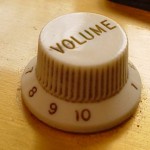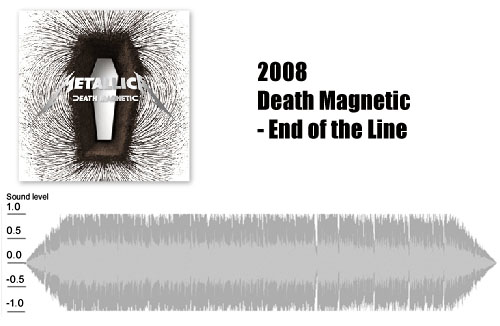 Heavy Metal is characterized by massive sounds, strong vocals, amplified distortion, guitars, and overall loudness. Metallica certainly fits the description very well. However, loud in itself is the not the end-all-be-all or definition of good music. Hearing loss is also a negative side effect of hearing music too loud. Over the years, Metallica has brought us great music (personal favorite is the song One). More recently, Metallica, along with all others in the genre are more concerned over winning the Heavy-Metal battle of who can play the loudest music. That being the criteria, music stops being music and it just becomes noise. You know this is true when even Heavy-Metal fans complain that the music is too loud.
Heavy Metal is characterized by massive sounds, strong vocals, amplified distortion, guitars, and overall loudness. Metallica certainly fits the description very well. However, loud in itself is the not the end-all-be-all or definition of good music. Hearing loss is also a negative side effect of hearing music too loud. Over the years, Metallica has brought us great music (personal favorite is the song One). More recently, Metallica, along with all others in the genre are more concerned over winning the Heavy-Metal battle of who can play the loudest music. That being the criteria, music stops being music and it just becomes noise. You know this is true when even Heavy-Metal fans complain that the music is too loud.
According to an article in The Wall Street Journal, Metallica’s ninth album, Death Magnetic has been engineered to sound loud. This process raises the average sound level and reduces the dynamic range. Basically, crank up the volume without care to quality of sound. The beauty of songs such as One is the dynamic range of near silence to the build up of vocals, base, and guitars. The sounds become “too loud” once you can no longer distinguish and hear nuances of the different instruments or vocals.
The below illustrations show the difference between Metallica album from 1988 and 2008.








Jazzaphone is the only one who knows what he’s talking. The others here cant be heavy metal fans coz ::
More recently, Metallica, along with all others in the genre are more concerned over winning the Heavy-Metal battle of who can play the loudest music.
rofol!!! metallica have actually been toning down their sound since their eighties. Ever since the Black album, metallica arent even considered heavy metal or thrash.If you think metallica is bad, wait till u listen to all those Norwegian black metal bands(Emperor,immortal,enslaved) and swedish de-ath metal bands. And, just cause its loud doesnt mean its noise. These works have great compositions and melodic guitars. The gutteral vocals are there only for the aggressive sound.Only an amateur call the song noise based on the vocals.
I was in rock bands before most of you were even a wink in your parents eye’s. There were times we would jam in a little room with the volume at 11. I’m 55, my hearing was checked 5 years ago and was perfect. Also, Metallica is not heavy metal, they are hard rock, and even then, they aren’t the masters.
If the sound’s too loud, TURN THE VOLUME DOWN.
I’ve been listening to heavy metal for 5 years now and according to some test I have almost no hearing loss.
Metallica is heavy-metal? I swear i’ve listened to the whole discography, I can’t believe I never knew they were heavy-metal. *sarcasm*
Where do you even get your information? It sounds like you are just making it up.
“More recently, Metallica, along with all others in the genre are more concerned over winning the Heavy-Metal battle of who can play the loudest music.”
I’d like to see any evidence of the existence of this “Heavy-Metal Loudness Battle”.
This whole article is vague and ill-informed. Music blogs ft .. fail.
The issue with loudness is that it’s not simply playback volume. It’s loudness created artificially through the use of compression. Compression means reducing the dynamic range, or volume range, between the loudest parts and the quietest.
To understand what’s happening, it’s important to understand how we perceive loudness. Short bursts of high amplitude sound are called “peaks.” These short bursts are not heard as “loudness” but rather as texture, punch, and/or peakiness. Loudness is perceived through the average amplitude level over a longer period of time (longer meaning centiseconds).
Fast acting, hard compression, called “limiting” basically allows the quieter sounds to come up – extending the average volume without changing the peak volume. Our ear interprets this as louder.
The problem is that there are often unwanted artifacts from this process. Natural sound is composed of peaks – and losing these peaks distorts that sense. It makes the sound “2d.” It also changes the frequency balance of the song. We hear frequencies in the 1-4k range much more loudly than frequency of 100hz and less, even at the same amplitude. For this reason, a balanced mix will often have the lower frequencies at a higher level to account for this. Compression knocks these frequencies back first, because amplitude wise, they are bigger. This makes the 1-4k range appear to get louder. In other words, heavy compression makes the kick and bass disappear. To compensate, engineers often eq the 1-4k range down, but this results in a somewhat thin sounding song comparatively speaking.
Heavy compression often results in “pumping” and “breathing.”
These strange artifacts make the music feel like it’s moving in and out. It distorts the way spatial cues exist in the sound, and overall just sounds kind of weird.
This competition to get music louder is often called “The Loudness War.” The premise is that louder is better, therefore louder music is better music. But why compress the music to have no dynamic range, when the end user could simply just turn up the volume?
To be fair, the bass guitar (<– right spelling btw!) in …and justice for all, was almost completely non existent. That’s a lot of space in the waveform. You should have used a better example from Master of Puppets. It’ll show a more realistic contrast…
But to be honest, I know exactly what you’re talking about. Death Magnetic is very loud compared to the rest of my CD’s.
Check out http://www.turnmeup.org/ too!
there is even a movement against this kind of behaivour, so often found in actual music
dynamicrange.de
“We are not surprised by the fact that music listeners are losing the willingness to legally acquire music, because of the fact that contemporary releases are mercilessly over-compressed* a situation that turns off even the biggest music fans”
It’s not just this album, rick rubin did it to the cash albums he produced. The man needs to have his compressors taken away from him or at least taught how not to make it distort all the time.
Overall the production is better on DM but the complete lack of dynamic range and off putting crackles from compression going wrong is a real killer for this album.